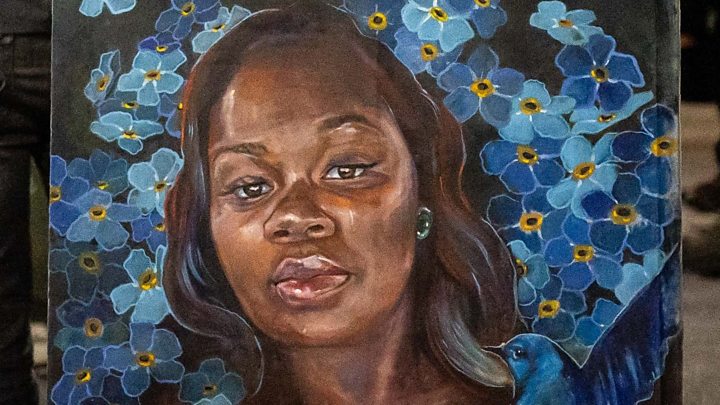
Media playback is unsupported on your device
Officials in Louisville, Kentucky have agreed to pay $12m (£9.3m) to the family of Breonna Taylor, a black woman who was killed in her home by police.
Taylor was 26 when she was shot eight times on 13 March during a mistaken drugs raid.
Her name has featured prominently in anti-racism protests in recent months.
Lonita Baker, a lawyer for Taylor's family, called the settlement just one "layer" in the effort to seek justice, and praised new police reforms.
"Justice for Breonna is multi-layered," said Ms Baker at a press conference on Tuesday alongside Louisville Mayor Greg Fischer.
She called the agreement "tremendous, but only a portion" of what the family hopes for, including the arrest of the officers involved in her death.
"Today what we did here was to do what we could do to bring a little bit of police reform and it's just a start," continued Ms Baker.
"But we finished the first mile in the marathon and we've got a lot more miles to go to until we achieve and cross that finish line."
The settlement includes a series of police reforms in the city, including a requirement that all search warrants be approved by a senior officer and giving a housing credit to officers who move to low income neighbourhoods they patrol in the city.
The settlement is the largest financial sum paid in a police misconduct case in the city's history, according to the Louisville Courier Journal.
Ms Taylor's killing was propelled into the spotlight once again with the death George Floyd, an African American man who died after a police officer knelt on his neck for minutes during an arrest in Minneapolis, Minnesota, in May.
The death of Mr Floyd sparked global anti-racism protests and brought renewed focus on police brutality.
What happened to Breonna Taylor?
Shortly after midnight on 13 March, three officers entered Taylor's apartment by executing a no-knock search warrant - a court document that authorises police to enter a home without warning.
Taylor and her partner, Kenneth Walker, were reportedly asleep as the commotion began.
The officers exchanged fire with Mr Walker, a licensed gun owner who called 911 in the belief that the drug raid was a burglary. The officers - who fired more than 25 bullets - said they returned fire after one officer was shot and wounded.
Image copyright Facebook Image caption Ms Taylor, 26, was a decorated emergency medical technicianDuring the exchange, Taylor, an emergency medical technician, was shot eight times and later died.
No drugs were found on the property.
The lawsuit filed by Taylor's family accuses the officers of battery, wrongful death, excessive force and gross negligence. It also says the officers were not looking for her or her partner, but for an unrelated suspect who did not live in the complex.
Her family has also accused police of leading the raid as a plot to gentrify her neighbourhood. The city's mayor dismissed the allegation as "outrageous" and "without foundation or supporting facts".
One of the officers involved in the raid, Brett Hankison, was fired in June. The other two - Jonathan Mattingly and Myles Cosgrove - were placed on administrative leave.
The city's police chief was also fired in June after a separate police shooting.
A grand jury could soon decide whether criminal charges should be filed against any of the officers.
Until Freedom, a social justice organisation that has held rallies for Taylor, released a statement saying: "No amount of money will bring back Breonna Taylor."
"True justice is not served with cash settlements," the group added. "We need those involved in her murder to be arrested and charged. We need accountability. We need justice."
Earlier this year, Louisville's city council voted unanimously in favour of banning no-knock warrants. Similar legislation that would ban the warrants nationwide was introduced in the US Congress.

 5 years ago
773
5 years ago
773 

